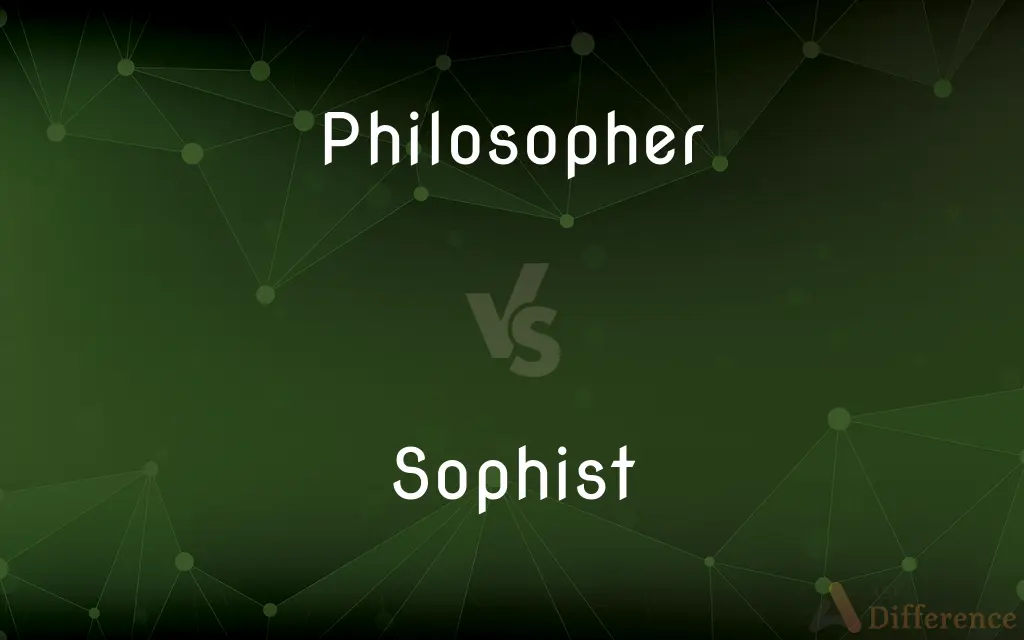Philosopher vs. Sophist — What's the Difference?
By Tayyaba Rehman & Fiza Rafique — Updated on April 23, 2024
A philosopher seeks truth and wisdom through reasoned argument, focusing on ethical and existential questions; a sophist, historically, taught persuasive speaking for personal gain, often regardless of truth.

Difference Between Philosopher and Sophist
Table of Contents
ADVERTISEMENT
Key Differences
Philosophers engage in the pursuit of knowledge and truth, exploring fundamental questions about existence, morality, and the universe. They often seek to understand the underlying principles of reality and human life. On the other hand, sophists in ancient Greece were teachers of rhetoric who charged fees to teach young men how to speak effectively and persuasively, primarily to achieve success in political and legal arenas.
The goal of a philosopher is to foster understanding and insight, using logical reasoning to reach conclusions that are intellectually and ethically sound. Whereas sophists were more focused on the art of persuasion, often using arguments that sounded plausible rather than those that were necessarily true, to convince their audience.
Philosophy as a discipline values critical thinking and encourages questioning established norms and beliefs to get closer to truth. In contrast, sophistry emphasizes the effectiveness of communication and the power of convincing others, regardless of the factual accuracy or intellectual rigor of the argument.
Philosophers typically present their ideas through academic channels such as journals, books, and conferences, aiming for peer review and long-term contribution to human knowledge. Sophists, historically, were practitioners of rhetoric who operated in public forums and courts, tailoring their teachings to immediate practical outcomes rather than long-term intellectual development.
The legacy of philosophers is often measured by the depth and originality of their ideas and their contribution to ongoing philosophical debates. Conversely, the legacy of sophists is tied to their skill in teaching rhetoric and their impact on the persuasive abilities of their students, rather than on contributions to philosophical thought.
ADVERTISEMENT
Comparison Chart
Primary Focus
Seeking truth and wisdom.
Teaching persuasive speaking.
Goal
Understanding and insight.
Success in persuasion.
Value
Truth, ethical soundness.
Effectiveness, practical success.
Methods
Logical reasoning, critical thinking.
Rhetorical skills, plausible arguments.
Contribution
Intellectual and ethical insights.
Skills in argumentation and public speaking.
Compare with Definitions
Philosopher
An academic involved in the systematic study of concepts.
He is a philosopher specializing in metaphysics.
Sophist
A person using clever but fallacious reasoning.
The lawyer's sophist tactics frustrated the straightforward discussion.
Philosopher
A person who seeks knowledge and truth about fundamental issues.
The philosopher debated questions of freedom versus determinism.
Sophist
One who makes a show of wisdom in speech.
His speeches were more sophist in style, prioritizing flair over substance.
Philosopher
Someone who uses reason to understand the world.
As a philosopher, she examines the logical structure of arguments.
Sophist
A teacher of rhetoric in ancient Greece.
The sophist taught young politicians how to sway the public.
Philosopher
A thinker who addresses ethical and existential questions.
The philosopher wrote extensively on the ethics of artificial intelligence.
Sophist
Someone skilled in elaborate and deceptive arguments.
Critics often dismissed him as a sophist because of his misleading rhetoric.
Philosopher
A person known for profound ideas or wisdom.
Historically, philosophers like Socrates are revered for their pursuit of truth.
Sophist
An expert in persuasive speaking.
As a modern sophist, she knew how to manipulate public opinion.
Philosopher
A philosopher is someone who practices philosophy. The term philosopher comes from the Ancient Greek: φιλόσοφος, romanized: philosophos, meaning 'lover of wisdom'.
Sophist
A sophist (Greek: σοφιστής, sophistes) was a teacher in ancient Greece in the fifth and fourth centuries BC. Sophists specialized in one or more subject areas, such as philosophy, rhetoric, music, athletics (physical culture), and mathematics. They taught arete – "virtue" or "excellence" – predominantly to young statesmen and nobility.
Philosopher
A student of or specialist in philosophy.
Sophist
One skilled in elaborate and devious argumentation.
Philosopher
A person who lives and thinks according to a particular philosophy.
Sophist
A scholar or thinker.
Philosopher
A person who is calm and rational under any circumstances.
Sophist
Sophist Any of a group of professional fifth-century BC Greek philosophers and teachers who speculated on theology, metaphysics, and the sciences, and who were later characterized by Plato as superficial manipulators of rhetoric and dialectic.
Philosopher
(originally) A lover of wisdom.
Sophist
One of a class of teachers of rhetoric, philosophy, and politics in ancient Greece.
Philosopher
A student of philosophy.
Sophist
(figuratively) A teacher who uses plausible but fallacious reasoning.
Philosopher
A scholar or expert engaged in or contributing to philosophical inquiry.
Sophist
One who is captious, fallacious, or deceptive in argument.
Philosopher
(archaic) A person who applies the principles of philosophy to the conduct of their life, as by acting calmly and rationally in the face of inevitable change.
Sophist
(dated) university student who has completed at least one year
Philosopher
(archaic) A student, scholar, or expert in any branch of knowledge, especially those branches studied prior to being considered part of pure science.
Sophist
One of a class of men who taught eloquence, philosophy, and politics in ancient Greece; especially, one of those who, by their fallacious but plausible reasoning, puzzled inquirers after truth, weakened the faith of the people, and drew upon themselves general hatred and contempt.
Many of the Sophists doubdtless card not for truth or morality, and merely professed to teach how to make the worse appear the better reason; but there scems no reason to hold that they were a special class, teaching special opinions; even Socrates and Plato were sometimes styled Sophists.
Philosopher
(obsolete) An alchemist.
Sophist
Hence, an impostor in argument; a captious or fallacious reasoner.
Philosopher
One who philosophizes; one versed in, or devoted to, philosophy.
Then certain philosophers of the Epicureans, and of the Stoics, encountered him.
Sophist
Any of a group of Greek philosophers and teachers in the 5th century BC who speculated on a wide range of subjects
Philosopher
One who reduces the principles of philosophy to practice in the conduct of life; one who lives according to the rules of practical wisdom; one who meets or regards all vicissitudes with calmness.
Sophist
Someone whose reasoning is subtle and often specious
Philosopher
An alchemist.
Philosopher
A specialist in philosophy
Philosopher
A wise person who is calm and rational; someone who lives a life of reason with equanimity
Common Curiosities
What is the main ethical difference between a philosopher and a sophist?
Philosophers seek truth, while sophists aim for persuasion, often disregarding truth.
Why were sophists important in ancient Greece?
Sophists were crucial in teaching effective communication, essential for public and political life in Greek democracies.
How does society value philosophers today?
Society values philosophers for their critical thinking skills and ethical reasoning, which contribute to debates on complex issues.
Do philosophers influence political theories?
Yes, philosophers have historically shaped political theories and ideologies through their ethical and logical analyses.
Were sophists respected in their time?
Sophists were both respected for their skills and criticized for their perceived lack of ethical grounding.
What modern professions might be considered sophistical?
Professions like advertising, where persuasion often outweighs the importance of truth, can be seen as sophistical.
Can a philosopher be a sophist?
While both use reasoning, their goals differ; a philosopher values truth which conflicts with the sophist's focus on persuasion over truth.
How did Plato differentiate between philosophers and sophists?
Plato criticized sophists for their lack of commitment to truth, unlike philosophers who aim to discover fundamental truths.
What skills did sophists teach that remain relevant?
Sophists taught rhetoric and persuasion, skills still essential in law, politics, and business.
How do the teachings of philosophers impact education?
Philosophical teachings influence critical thinking and ethical reasoning in educational curriculums across various disciplines.
Share Your Discovery

Previous Comparison
Consistency vs. Discipline
Next Comparison
Mountain vs. ButteAuthor Spotlight
Written by
Tayyaba RehmanTayyaba Rehman is a distinguished writer, currently serving as a primary contributor to askdifference.com. As a researcher in semantics and etymology, Tayyaba's passion for the complexity of languages and their distinctions has found a perfect home on the platform. Tayyaba delves into the intricacies of language, distinguishing between commonly confused words and phrases, thereby providing clarity for readers worldwide.
Co-written by
Fiza RafiqueFiza Rafique is a skilled content writer at AskDifference.com, where she meticulously refines and enhances written pieces. Drawing from her vast editorial expertise, Fiza ensures clarity, accuracy, and precision in every article. Passionate about language, she continually seeks to elevate the quality of content for readers worldwide.
















































